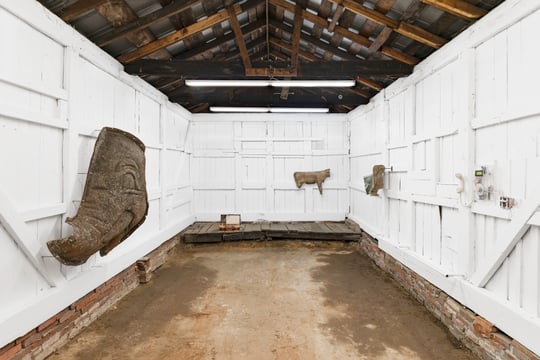As artists, we would all prefer to be in the studio doing our work and to ignore the business of it, but if you are selling artwork, or plan to do so, there is a good chance you need a business license. In fact, if you make more than $400 per year selling artwork, you are required to have one.
Disclaimer: I am not a lawyer, an accountant, a tax expert or a government representative, but I am an artist working in Atlanta who cares about sharing information and making it easier for artists to succeed.
I recently moved back to Atlanta after spending two years teaching and making work in Hong Kong. While teaching, it was a struggle to give my work and studio practice proper attention outside the summer breaks, so I wanted to make sure as I returned to Atlanta as a full-time artist that I took my career seriously. I determined the first step after setting up my studio was to obtain a business license. I wanted to take advantage of being a sole proprietor, so that I could claim my home studio space and expenses on my taxes, as well as buy art materials tax free and where possible, at wholesale prices.
As I started to wade through the vast information on the Internet, it was clear that I was not going to be able to find everything in one place. I was confident that if I was patient and focused that I would be able to manage the work myself. Here’s what I learned.
1. Determine if Sole Proprietorship is right for your practice.
There are several different structures for businesses: Sole Proprietorship, Partnership, Corporation, and Limited Liability Company/Partnership. I won’t go into depth on all of the differences and the details, but the reasons I choose the Sole Proprietorship was it was the easiest, cheapest, and I was the only owner, as are most artists.
2. Doing Business As (DBA), Fictitious Name, and Trade Name.
These are all one and the same. You will need to decide the name of your business before you get started. To make this step as painless as possible, I strongly recommend that you choose a name that includes your surname. This will eliminate extra paperwork and fees. If you use a trade name that does not include your surname, you will need to register it with the Fulton Country Clerk of Superior Court, or the Clerk of the Supreme Court in your county. My legal name is Christopher Revelle, but my Business Name or DBA is “Chris Revelle.” I could have gone with “Revelle Studio,” “Studio of Chris Revelle,” or “Chris Revelle Art,” to provide a few examples.
3. Register as a Sole Proprietor at the GA Tax Center.
Georgia Tax Center provides an easy video on how to set up your user name and register. On the sign-up form you will be asked to describe your business. You can keep this brief and simple with a description like, “Independent Artist.” When registering your new tax account, you will choose “Sales & Use Tax” from the Account Type menu, and then use the current date as your start date. For the business address, I used my home address, as this is where my studio is located. You will be asked for a North American Industry Classification System (NAICS) code, which is a code for classifying your business. I used the code “711510” for “Artists (i.e., painters), independent,” but you can search the database to find something more accurate for your business.
4. Applying for an Employer Identification Number (EIN), also known as a Federal Tax Identification Number.
This step is optional as you do not need an EIN for a sole proprietorship, but it provides a layer of protection for your Social Security Number (SSN), as you can provide the EIN for purchases instead of your SSN. In addition, it helps demonstrate to the IRS that your art practice is a business and not a hobby. You are required to have an EIN if you hire assistants, full-time or part-time. You will also need an EIN if you want a credit card or bank account in the name of your business.
The application is straightforward and easy to complete. You can then add the EIN number to your tax account at the Georgia Tax Center.
5. Submitting the New Business License Application.
Business License Applications must be submitted to your city/county. You may live in a different city and county within Atlanta, so please check with your local office. I am using the City of Atlanta as the example.
For the most part, the items needed by all GA cities are similar:
- New Business License Application
- Notarized E-Verify Affidavit
- Notarized SAVE Affidavit
- Application and Zoning Fees
- Copy of Government Issued ID
The City of Atlanta has a breakdown of the requirements, links to the files, and a full description of these items. Your city will have their version of this webpage along with specific files and instructions.
For the City of Atlanta application, there are some codes and numbers that you will have, will not have, and do not need. First, the State of GA Tax ID Number and Federal Employer ID Number (EIN), you already have both numbers from Steps 3 and 4. The State of Georgia Sales Tax ID Number you will receive with your Sales Tax Certificate of Registration, which will be mailed to you after Step 3. You do not need to wait on this number though. The Secretary of State Control Number will be for Corporations and LLCs, so you will not need that. Your title in the business is “Owner.”
The E-Verify and SAVE Affidavits are both simple but do need to be notarized. Operated by the Department of Homeland Security (DHS) in partnership with Social Security Administration, E-Verify is a system that compares information to confirm employment eligibility. Similarly, SAVE, or Systematic Alien Verification for Entitlements, is a federal program operated by the U.S. Citizenship and Immigration Services, to determine the immigration status of business license applicants.
The City of Atlanta E-Verify form asks for your Business License Account Number, but you can leave this blank, as you do not have this number yet. You will be exempt from the E-Verify requirements, as you will have less than 11 employees. You do not count yourself as an employee.
The application fee for the City of Atlanta is $75.00 and the zoning review fee is $50.00. These fees must be paid with guaranteed funds, such as a money order or cashier’s check. There is a chance that your city may also accept personal checks, and debit/credit cards.
For the City of Atlanta, there are two options for submitting your materials to the Office of Revenue at 55 Trinity Avenue SW, Suite 1350, Atlanta, GA 30303. I recommend taking the materials in person as you can usually complete the process on the same day. You may also mail your materials, but the wait is estimated at 3-5 weeks.
Some cities may ask you to estimate your “gross receipts” for the current year so that you can pay your estimated taxes. You may have already sold work or plan to, which you would declare, but it is completely reasonable for a new business to have no gross income for their first year as they establish themselves.
You will need to renew your business license every year, between January 1 and February 15. For most cities, this can be completed online. For the City of Atlanta, the online renewal and instructions are linked here.
6. How to take advantage of your Business License and Sales Tax Number.
The most immediate benefit is the Sales Tax Exemption for your art materials. You can find the form here, and then present it to your local art supply store. This can be used for any materials that you will sell as your artwork. For example, if you are a painter, you can purchase the canvas and paint tax-free but not the brushes. You can buy the canvas and paint tax-free because you will be charging sales tax on them when you sell the painting.
If you plan on claiming your home studio as a deduction, this must be a committed studio/office space that can also include a storage area for equipment, materials, business records, and supplies; a darkroom; and a meeting room for clients/customers. The space must be solely for your business, so you could not claim your kitchen as a break room. The maximum space that can be claimed is 25 percent of your home, along with associated fees. For example, if your home is 1,000 square feet and your studio is 200 square feet, you can claim 20 percent of related expenses towards your business. The associated fees can be mortgage or rent, real estate tax, utilities (electric, gas, Internet, water, sewer), insurance, and repairs. Keep all the paperwork/bills for these items. In addition, you can deduct any costs that are business related, but again keep good records
7. Never hesitate to ask questions.
My hope is to help artists with their business and relieve some of the frustrations so you can enjoy the benefits of being legally sound. If there is something you are unsure of on the application and required documents for your city, reach out to them and ask questions, even the “dumb” ones. That’s what they’re there for.
The more you know, the easier the process.
Chris Revelle is an artist based in Atlanta. He taught at the Savannah College of Art and Design in Atlanta from 2008 to 2015, and served as Chair of Fine Arts at SCAD-Hong Kong from 2015 to 2017.





